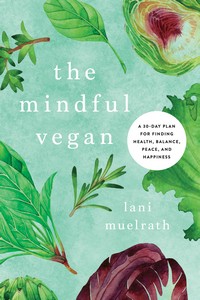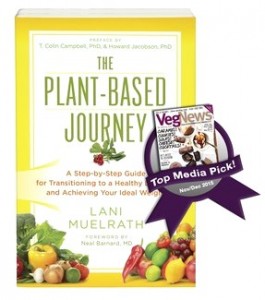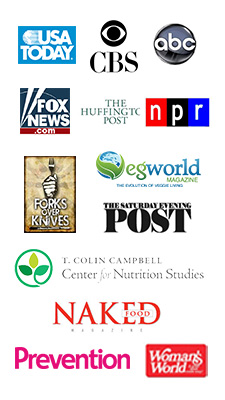 Do you need to supplement vitamin b12 on a plant-based diet that includes no animal products?
Do you need to supplement vitamin b12 on a plant-based diet that includes no animal products?
The short answer? Yes. But does that make a diet without animal products somehow flawed? Not when you understand where the b12 comes from.
Where does vitamin b12 come from, anyway?
B12 is bacteria born and in our sanitized food environment it’s all cleaned off the veggies. On a non-animal food diet you don’t get it. Animal products are contaminated enough that it’s there.
In contrast to most vitamins which are synthesized by plants, vitamin b12 is unique as it is synthesized naturally by bacteria growing in soil, water and the intestinal tract of animals. That’s why the vast majority of plants don’t contain vitamin B12, and any trace B12 in plants are due to microbial contamination from soil or manure.
The best dietary sources of vitamin B12 are foods of animal origin, such as meats. Vitamin B12 originating in protein sources, like meats, are derived from the animals ingestion of cobalamin-containing animal tissues, in addition to vitamin B12 synthesized by bacteria within the animals own digestive tract.
So this doesn’t mean a plant-based diet is inherently deficient. It just means we’ve gotten so clean with food processing these days when it comes to veggies (barring the occasional ecoli contamination) that we can only get this particular bacteria from animal products which is…well, contaminated!
Although vitamin B12 is found in animal foods it is not synthesized by plants or animals. Only bacteria make biologically active vitamin B12—animal tissues store “bacteria-synthesized B12,” which can then be passed along the food chain by animals eating another animal’s tissues. Ruminants (like cows, goats, sheep, giraffes, llamas, buffalo, and deer) are unique in that bacteria in their rumens (stomachs) synthesize vitamin B12, which is then passed down and absorbed by their small intestines. Lions and tigers get their B12 from eating these grazers.
The human gut also contains B12-synthesizing bacteria, living from the mouth to the anus.8 The presence of these bacteria is an important reason that disease from vitamin B12 deficiency occurs very rarely in people, even those who have been strict vegetarians (vegans) all of their lives. The colon contains the greatest number of bacteria (4 trillion/cc of feces), and here most of our intestinal B12 is produced.
However, because B12 is absorbed in the ileum, which lies upstream of the colon, this plentiful source of B12 is not immediately available for absorption—unless people eat feces (don’t gasp). Feces of cows, chickens, sheep and people contain large amounts of active B12. Until recently most people lived in close contact with their farm animals, and all people consumed B12 left as residues by bacteria living on their un-sanitized vegetable foods.
~ Dr. John McDougall
If you found yourself hitting rewind to catch Dr. McDougall’s mentioned form of b12 supplement, I’ve got your back. Dr. McDougall recommends the hydroxy or methyl forms of vitamin b12 supplement.
As little as 0.3 to 0.65 micrograms per day of vitamin B12 has cured people of megaloblastic anemia;9 however, to add an extra margin of safety I have recommended a higher dosage of 5 micrograms per day. You may be surprised to discover that you cannot purchase these tiny dosages. Supplements sold contain 500 to 5000 micrograms per pill. These exaggerated concentrations will correct by passive absorption B12 deficiency caused by disease of the intestine.16-17 Everyone else is being overdosed by a factor of 1000. If you are an otherwise healthy vegan and are using typical dosages of B12 (500 micrograms or more per pill), a weekly dose of this vitamin will be more than sufficient. ~ Dr. John McDougall
And if you’re ready for a boatload more of details, documentation, and references on the “where to get your b12” question, here is more from Dr. McDougall: Vitamin B12 Deficiency: The Meat-Eater’s Last Stand.
“Reliable Non-animal Sources of Vitamin B12
by Reed Mangels, Phd., R.D., Vegetarian Resource Group
A number of reliable vegan food sources for vitamin B12 are known. One brand of nutritional yeast, Red Star T-6635+, has been tested and shown to contain active vitamin B12. This brand of yeast is often labeled as Vegetarian Support Formula with or without T-6635+ in parentheses following this new name. It is a reliable source of vitamin B12. Nutritional yeast, Saccharomyces cerevisiae, is a food yeast, grown on a molasses solution, which comes as yellow flakes or powder. It has a cheesy taste. Nutritional yeast is different from brewer’s yeast or torula yeast. those sensitive to other yeasts can often use it.
The RDA for adults for vitamin B12 is 2.4 micrograms daily (1). About 2 rounded teaspoons of large flake Vegetarian Support Formula (Red Star T-6635+) nutritional yeast provides the recommended amount of vitamin B12 for adults (2). A number of the recipes in this book contain nutritional yeast.
Another source of vitamin B12 is fortified cereal. For example, Nature’s Path Optimum Power cereal does contain vitamin B12 at this time and about a half cup of this cereal will provide 2.4 micrograms of vitamin B12 (3). We recommend checking the label of your favorite cereal since manufacturers have been known to stop including vitamin B12.
Other sources of vitamin B12 are vitamin B12 fortified soy milk, vitamin B12 fortified meat analogues (food made from wheat gluten or soybeans to resemble meat, poultry, or fish), and vitamin B12 supplements. There are vitamin supplements that do not contain animal products.
Vegans who choose to use a vitamin B12 supplement, either as a single supplement or in a multivitamin should use supplements regularly. Even though a supplement may contain many times the recommended level of vitamin B12, when vitamin B12 intake is high, not as much appears to be absorbed. This means in order to meet your needs, you should take a daily vitamin B12 supplement of 5-10 micrograms or a weekly vitamin B12 supplement of 2000 micrograms (4).
Are you getting all the news that’s healthy, fit, happy and hot? Click here to join 1,000′s of others + get your weekly health, body shaping and food advice for free from the Plant-Strong Fitness Expert.




Lani, I just found your website and I love, love it! You have so much information and you put it out there in a fun and easy-to-understand way.
Including this b12 article. I appreciate that you also posted the video, along with the comments because it helps me clarify and know what to do.
So much else to explore here!
Thanks!
Francesca
Hi Francesca!
Well, I’m so glad we found eachother! It totally makes my day when some information I can pass along hits your sweet spot – and that you took the time to tell me. I SO appreciate that!
Enjoy looking around and don’t forget to download your Free Body Shaping Kit!
Lani
Thanks for this, Lani! I always like to read/hear more about the B12 issue that is accessible to those of us without a degree in biology 🙂 I need to find a good supplement but, to be frank, there are just too many options out there and I’m feeling a bit befuddled. Also, I need to find a source for my kids, and don’t have a clue which is best for them. We’ve only been living plant-strong for a few days, so it’s not exactly a pressing issue yet, but the sooner I get it figured out the more content I will be.
Do you have any suggestions, especially on the children’s supplementation issue?
Karena, I’m glad you found relief with this information. It can seem like a lot to wade through at times, yet when we forge the territory of high nutrient diet as we can in plant-based, it’s a relief to know there are just a couple things to pay attention to when it comes to supplementation. So much of it is driven my the supplement industry.
Easy reliable sources of non-animal b12 are Red Star fortified Nutritional Yeast – 2 rounded tsps. gives you all you need a day, and remember you don’t need to take b12 every day.
For the kids, they would love this brand that I just pulled out of my cupboard to share with you. Bluebonnet EarthSweet, tiny berry flavored tabs with 1,000 mcgs per tab of the methyl form, which is as Dr. McDougall recommends above. The only problem with these is I can pop them like candy and gee, you only need one! Boo, hiss!
I just added a whole new section to the article for you. You’ll find it at the end, “Non-animal sources of Vitamin b12.
Hope this helps Karena and thank for bringing this question up.
Thanks for the great information! I wonder why the tabs have so many mcgs when the daily need is actually quite low?
We’ve got a vat of nutritional yeast – time to start sprinkling it liberally 🙂 Again, thanks for the help!
Hey Karena, you know it probably is related to absorption. Which is actually the cause of most b12 deficiencies – absorption problems! So overshoot no doubt, but there’s no toxicity problem from a little bit too much b12.
And a couple of teaspoons isn’t that much – I’m talking about the yeast. So unless a yeast problem…. I like to shake it over my salads and toss it in.
Thanks for your comments!
I use the nutritional yeast, fortified with B12, liberally every day. I love the taste of it so much that I think I could just eat it from a spoon and be happy, but I use it with natural peanut butter and my roasted flax seed on WW toast for lunch and then often put it into dishes I make for supper and upon steamed veggies to give them a good flavor enhancement. It is a good substitute for a buttery/cheesy flavor, and as far as I know, good for you as well – really good things aren’t ALWAYS evil for you!
Gee Donna, you are the go-to expert it seems on nut yeast for tastey options! Do you have a favorite recipe for red star mac/cheese sauce that has no added fats?
I’m afraid that I haven’t tried doing that, though I did track down some Bionaturae organic WW macaroni (it won the taste trial on America’s Test Kitchen – no comment on the healthiness of most of the recipes they make on there!) elbows a while back, which would be an interesting project to try one of these days.
Firstly, with an ever growing base of customers, Facebook
is a enormous web page that at the moment holds more than 800 million user
accounts. Search engines such as Google are now searching to Facebook in order to be involved with this extensive social-network.
Facebook For Search Engines And Organizations facebook likes free sites (http://www.pock-blog.com/Adobe_Social)
The button is already displaying up on pretty much each internet site, even news web pages like
The Washington Post Just as any excellent webmaster would
do, they are adding the “Like” button hoping to get more hits.
facebook likes hack app (ibaragi-home.info)
Garden Of Life makes an Organic B-12 spray that is vegan Methylcobalamin and it is 500 mcg per spray. It is raspberry flavored. This is a simple way to get B-12 and it’s pleasant tasting. Thought I would share this option in case someone didn’t know about it.